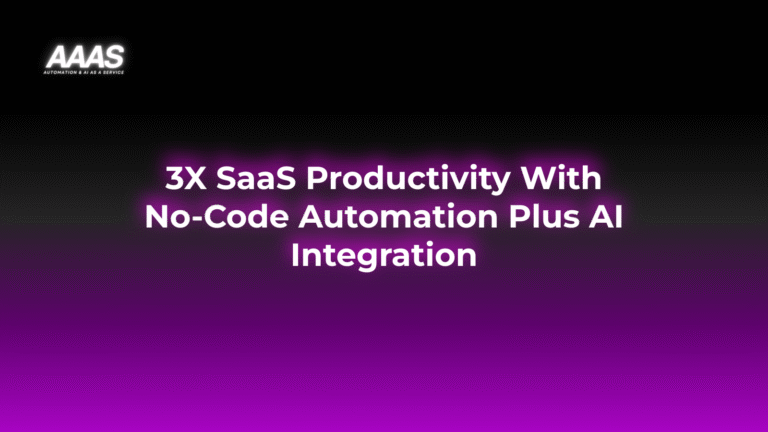Leveraging No-Code Automation and AI Integration for Scalable SaaS Workflow Solutions

The Current Market Problem: Inefficiency in SaaS Workflows
Modern SaaS businesses face an unprecedented volume of repetitive, manual processes, leading to productivity bottlenecks and increased operational costs. Traditional workflow automations require technical resources that are both costly and scarce. As SaaS platforms proliferate inside organizations, integration gaps and human intervention result in:
- Slower response times
- Redundant data entry
- Inconsistent customer experiences
- Lower ROI from software investments
No-Code Automation & AI: The Scalable Solution
No-code platforms and AI integrations empower users with non-technical backgrounds to automate complex workflows intuitively. By leveraging drag-and-drop interfaces and AI-driven logic, organizations can achieve:
Core Benefits
- Boosted Productivity: Streamline tasks, reduce manual work, and eliminate errors.
- Operational Efficiency: Integrate disparate SaaS tools seamlessly and synchronize data in real time.
- Scalable Workflows: Rapidly adapt processes to changing business needs without lengthy development cycles.
- Measurable ROI: Reduce costs, minimize resource allocation, and increase competitive advantage.
For a deeper dive on SaaS integration strategies, see [InternalLink:saas-integration-strategies|Best SaaS Integration Strategies].
Real Industry Use Cases
1. Automated Customer Onboarding
With tools like Zapier or Make, SaaS companies can trigger welcome emails, create CRM records, and provision accounts instantly when a new customer signs up.
2. AI-Powered Support Ticket Routing
Integrate AI (like OpenAI) with help desk platforms (e.g., Zendesk) to analyze ticket content, categorize queries, and route them to the right team—reducing first-response times by up to 40%.
3. Automated Financial Reporting
No-code automation can pull sales data from Stripe, consolidate with invoices from QuickBooks, and generate real-time dashboards in Google Sheets—freeing finance teams from hours of manual work.
Technical Approach: How No-Code and AI Platforms Integrate
No-code automation platforms (e.g., Zapier, Make, n8n) interact with SaaS applications via APIs, webhooks, and prebuilt connectors. AI services are integrated via RESTful APIs or direct platform plugins. Typical architecture includes:
- Trigger: An event in a SaaS app (e.g., new user sign-up)
- No-Code Platform Logic: Workflow built with conditional rules, branching, and data mapping
- AI Integration: NLP or machine learning API for enrichment (e.g., classifying support tickets or auto-generating responses)
- Action: Automated task execution across one or more SaaS tools

Security and Compliance
- Ensure all integrations use OAuth or token-based authentication
- Verify platforms are compliant with standards (GDPR, SOC 2, etc.)
- Regular audit logs and granular permissions
Comparison: No-Code & AI Integration vs Alternatives
| Feature | No-Code + AI Integration | Custom Development | Manual Processes |
|---|---|---|---|
| Time to Deploy | Hours to days | Weeks to months | Instant, but error-prone |
| Required Expertise | Minimal (non-technical) | Advanced (coding needed) | Basic user skills |
| Cost | Low-to-moderate | High (dev & maintenance) | High (hidden labor costs) |
| Scalability | High | Medium-high | Low |
| Flexibility | High (quick changes) | High | Low |
Pricing Table: Leading No-Code Automation & AI Solutions
| Platform | Starting Price/Month | Free Tier | Notable Features |
|---|---|---|---|
| Zapier | $19.99 | Yes | 5,000+ app integrations, AI actions |
| Make (Integromat) | $9 | Yes | Advanced scheduling, robust logic, API |
| n8n | $20 | Yes (self-hosted) | Open source, complex workflows |
| Parabola | $80 | Yes | Data processing, visual builder |
ROI-Focused Practical Examples
- SaaS Marketing Agency: By automating campaign reporting, a mid-sized agency saves 120 labor hours/month, freeing up staff for high-value strategy while reducing over $3,600 in monthly costs.
- Customer Success Teams: AI-powered automation for customer renewals increases retention rates by 8%, translating into a projected annual revenue boost of $420,000 for a SaaS firm with $5M ARR.
- Finance Departments: Automated invoice reconciliation reduces errors by 95% and accelerates quarterly close cycles by 30%—leading to tangible improvements in audit readiness and cost reduction.
Step-by-Step Setup Guide
- Identify repetitive SaaS tasks and pain points.
- Choose a no-code automation platform based on integration needs and cost (see pricing table).
- Select relevant AI services (text classification, sentiment analysis, OCR, etc.).
- Map out workflow logic: Define triggers, actions, and conditional branches.
- Connect your SaaS apps via platform connectors or API keys.
- Test and validate automation with sample data.
- Monitor, optimize, and iterate based on analytics and feedback.
For advanced integrations, see [InternalLink:no-code-api-integration-guide|No-Code API Integration Guide].
Pros & Cons
| Pros | Cons |
|---|---|
|
|
Expert Tips for Maximum Results
- Regularly audit automation logs to catch and correct exceptions early.
- Start with simple workflows—expand complexity as your team gains confidence.
- Where possible, select platforms with open APIs for future extensibility.
- Integrate AI-based decision points only after validating accuracy on sample datasets.
- Leverage community forums and real-world templates to accelerate deployment.
Frequently Asked Questions (FAQ)
- Can no-code automation handle complex, multi-step workflows?
- Yes, modern no-code platforms support advanced branching, looping, and conditional logic suitable for enterprise-grade processes.
- Is AI integration secure for sensitive SaaS data?
- Leading platforms use industry-standard encryption and comply with major frameworks. Always review the vendor’s security credentials and set granular permissions.
- Will automation replace jobs?
- No-code and AI empower teams to focus on strategic, creative, or customer-facing work, shifting repetitive or error-prone tasks to automation.
- How fast can automations be updated?
- Workflows can usually be modified instantly via visual editors, allowing rapid adaptation to new business requirements.
References & Citations
Last updated: September 23, 2025








